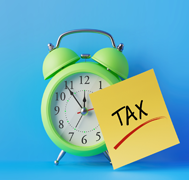2019 Tax Deadline Around the Corner – Let’s Review Current Penalties and Interest
 The Canada Revenue Agency (CRA) tax deadline for the 2019 tax year is coming up quickly. Are you prepared?
The Canada Revenue Agency (CRA) tax deadline for the 2019 tax year is coming up quickly. Are you prepared?
The deadline to file your 2019 income tax is April 30, 2020.
For self-employed tax filers, the deadline is June 15, 2020, however, it’s better to file by April 30 as you will be charged interest from May 1 to June 15.
It’s critical to meet the CRA filing deadline to avoid late-filing penalties, interest, and collection action — even if you can’t pay.
Here’s what you need to know about the 2019 tax filing deadline:
CRA Interest
One reason why you want to file on time and pay what you owe in full (or look into alternative options) is to avoid CRA interest charges.
If you have a balance owing for 2019 and don’t pay it in full, the CRA can begin charging you daily compound interest on May 1, 2020. This includes any balance owing if the CRA reassesses your return.
If you are charged penalties, such as a late-filing penalty, the CRA can also charge interest on this amount.
If you have amounts owing from previous years, the CRA will continue to charge daily compound interest on those, too.
CRA interest rates change every three months.
CRA Late-Filing Penalty
If you owe money to the CRA and miss the tax filing deadline of April 30, 2020 (or June 15, 2020 for sole proprietors) you can be charged a late-filing penalty.
In 2019, this penalty was 5% of your 2018 balance owing, plus 1% of your balance owing for each full month your return is late, up to a maximum of 12 months.
If you’ve been charged a late-filing penalty in the past three years, you could be charged even more for missing the April 30, 2020 deadline — 10% of your balance owing, plus 2% of your balance for each full month your return is late, up to a maximum of 20 months.
This is why, even if you can’t pay your full balance, it’s still best to file your return on time.
Repeated Failure to Report Income Penalty
If you failed to report an amount on your return for the 2019 tax year and you also failed to report an amount on your return for 2016, 2017, or 2018, you may be charged a repeated failure to report income penalty.
If you did not report an amount of income of $500 or more for a tax year, it will be considered a failure to report income.
The federal and provincial or territorial penalties are each equal to the lesser of:
- 10% of the amount you failed to report on your return for 2019.
- 50% of the difference between the understated tax (and/or overstated credits) related to the amount you failed to report and the amount of tax withheld related to the amount you failed to report.
In some cases, if you voluntarily tell the CRA about an amount you failed to report, the CRA may waive these penalties. However, if you choose to go this route it is better to do so with an advocate on your side (like DebtCare!).
False Statements or Omissions Penalty
If you knowingly make a false statement or omission, or do so through gross negligence, you could be charged a penalty equal to the greater of:
- $100
- 50% of the understated tax and/or the overstated credits
Again, in some cases, you can voluntarily tell the CRA about a false statement or omission and have the penalty waived. Again, it’s best to consult a debt counsellor first, such as DebtCare, before negotiating with the CRA.
What To Do If You Owe Taxes But Can’t Pay
As we’ve mentioned, if you know you will owe but can’t pay, it’s still important to file before the April 30, 2020 tax deadline.
Don’t just hope that it will be overlooked or go away on its own – it won’t, and you’ll end up accruing more interest and penalties. In some cases, the CRA will waive the penalties or interest, but you will still owe the principal amount.
Instead, make a plan for how you will pay what you owe.
This could look like:
- Making room in your budget to find the amount owing.
- Taking out a personal loan that you can repay over a longer period and using the money to pay the CRA.
- Consolidating debt.
- Refinancing your mortgage.
- And more.
If you truly cannot pay, nor can you access a personal or debt consolidation loan, you can stop CRA collection action by filing for bankruptcy or for a consumer proposal.
Get A Head Start By Contacting a Debt Counsellor
At DebtCare Canada, we provide access to one of the only programs that can resolve a CRA back tax problem.
Whether it’s personal income tax, HST, or payroll, DebtCare Canada can help! Get ahead of your tax problem. Reach out to us for a free consultation by calling 1-888-890-0888 or learn more about our CRA Tax Debt program at https://www.debtcare.ca/back-taxes/.


